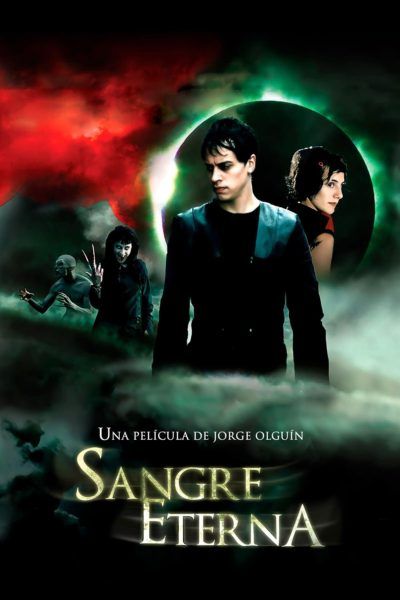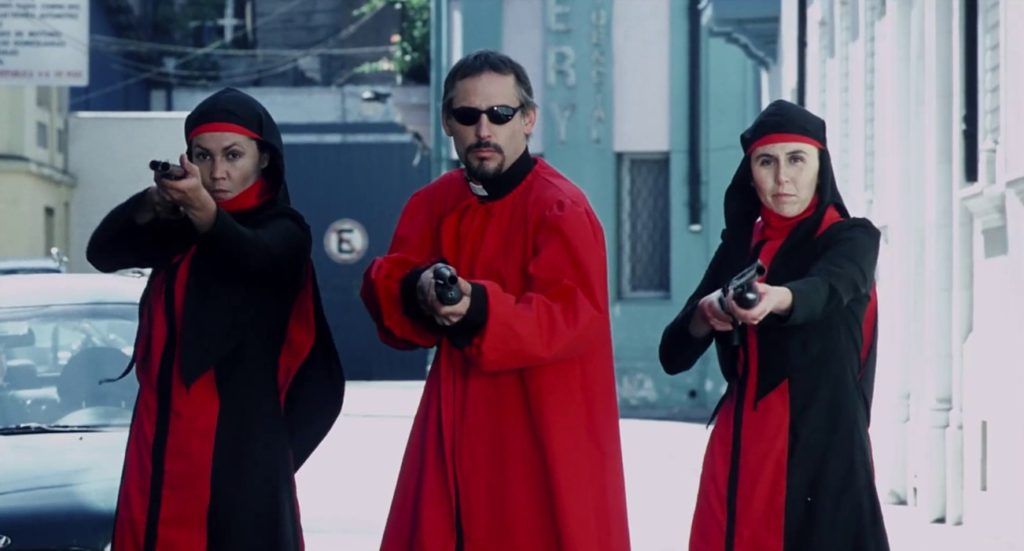
Rating: C+
Dir: Jorge Olguín
Star: Juan Pablo Ogalde, Blanca Lewin, Patricia López, Carlos Borquez
a.k.a. Sangre Eterna
In every subculture – be that involving games, music, media or sex – it seems there are people who don’t take it seriously, people who take it seriously, and then there are those who take it really seriously. As someone who almost inevitably falls into the first group, it’s the last-named who are the scary individuals. They’re the ones who put the “fan” in “fanatic”, for whom the thing, whatever it is, becomes the defining trait of their personality. These people do not take criticism well. I’ve found they do not even like the fact that other people might not be so “into” it as them, viewing that as some kind of personal slight.
This horror film from Chile goes does a somewhat similar path: there’s always someone Gother Than Thou. In this case, thou is a group of three students, who are engaged in a role-playing campaign, obviously inspired by Vampire: The Masquerade, but called by the film’s title, presumably for licensing reasons. M (Ogalde) is the master, and with the party having painted themselves into a sticky in-game situation, he’s looking for fresh blood to help out. This comes in the black-clad shape of Carmilla (Lewin), a fellow student who, like M, happens to live with a parent who disapproves of her lifestyle choices. After overcoming some doubts, she agrees to join the group, and to her surprise, finds she really enjoys the experience.
 After a successful gaming session, the quartet decide to go and celebrate at a club – naturally, the Gothest one they can find. It’s there they encounter those for who, the vampire life is not just a role-playing scenario for the evening. In particular, there’s Dahmer (Borquez) – yeah, I suspect all the names here are being chosen for a purpose. For beyond Carmilla, who shares her name with the heroine of Sheridan Le Fanu’s lesbian vampire novella, the other members of the group are called Elizabeth (López) and Martin. These are presumably in homage to the Countess Bathory and the film by George A. Romero respectively; indeed, the name of their college lecturer is Prof. Romero. Nobody refers to any of these, so you can feel smug by pointing them out.
After a successful gaming session, the quartet decide to go and celebrate at a club – naturally, the Gothest one they can find. It’s there they encounter those for who, the vampire life is not just a role-playing scenario for the evening. In particular, there’s Dahmer (Borquez) – yeah, I suspect all the names here are being chosen for a purpose. For beyond Carmilla, who shares her name with the heroine of Sheridan Le Fanu’s lesbian vampire novella, the other members of the group are called Elizabeth (López) and Martin. These are presumably in homage to the Countess Bathory and the film by George A. Romero respectively; indeed, the name of their college lecturer is Prof. Romero. Nobody refers to any of these, so you can feel smug by pointing them out.
This begins the group’s descent into… well, something. It’s clear that Dahmer is Gother Than Just About Everybody, and M becomes convinced that it’s not just an act. Dahmer increasingly appears to be a genuine vampire and his friends are now in severe peril of turning into, firstly, a snack, and then vampires themselves. All his role-playing experience does not quite prepare him for this. Prof. Romero, who is an expert on the history of Christianity, isn’t a great deal of help in regard to what he can do. However, M finds a gun in his father’s desk, and after a trip to the local church to dip the bullets in holy water, he’s ready to take on the forces of darkness and save his pals from a fate worse than undeath.
Except, the knowing references to Martin are perhaps the most relevant, since there’s a large question hanging over things, with regard to the reality of the situation. Is Dahmer actually the leader of a vampire cult, or is M confusing the fictional world of Eternal Blood with the everyday one? The further you go into proceedings, the more suspicious you likely are to become of M’s mental state. I did wonder whether Prof. Romero was going to end either being a vampire himself, or become a Van Helsing-like figure. The truth is, neither really happens, and he just kinda shuffles off after delivering some relatively minor exposition. Feels like a wasted opportunity.
I have to say, considering this was made on a low budget, there are points where it definitely punches above its weight. The first time we see the RPG is a nicely-rendered scene where the then trio of players are confronted in the street by literal nuns with guns (below) – okay, there’s a priest or two in there as well. It’s only after a bloody battle, that we cut to the rolling of dice, and realize this has all taken place only in their imagination. More of this might have been a good idea, especially since the later stages lean heavily into the issue of whether the same thing is going on for M. It’s also when the film is at its most fun, so is a shame this urban warfare was likely too expensive to play a bigger part, being the most FX-heavy sequence in proceedings.

It could probably have done with some trimming, especially in the middle, where it sags considerably. There’s also a bit of an odd shift in focus. We initially presume Carmilla is going to be the main character, but once she has joined the game, M takes over centre-stage, and it becomes almost exclusively his story the rest of the way. Truth be told, he is less interesting than she is, since we don’t get much information about his background outside of the game, which also appears to be his only interest. While this explains his near monomaniacal obsession, it doesn’t make for a particularly engaging hero.
I am glad I was able to watch this in a subtitled version. It was originally released dubbed, and the reviews which mentioned this were universally scathing about its qualities, or lack thereof. That said, there’s not much here which feels particularly Hispanic in nature, or specifically Chilean. Goth culture, role-playing and night-clubs seem almost comfortingly similar around the world. As are the occasional douchebags, who think of some or all these things are much more important than they are. But those are stories for another review, I think! This is an interesting idea, reasonably well-executed, although I would say, it feels like the potential in it is not entirely realized.
This review is part of our October 2023 feature, 31 Days of Vampires.
[December 2006] I guess the theme here is the dangers of obsessive role-playing…or is it vampirism? Not quite sure. Carmilla (Lewin) joins a close-knit community of Goths, who play a game like Vampire: The Masquerade. Only, the group are also getting involved with some really hardcore Goths, and one of them, ‘M’ (Ogalde) begins to think their new friend might have more secrets than the usual book of bad poetry. Can he save Carmilla and his friends from a fate worse than death? Or do they really need saving? The main problem here is, viewers will be some way ahead of the story, which takes far too long to develop: it’s more than an hour, before the dramatic reveal, and it doesn’t take Sherlock Holmes to work out what it’s going to be. Not that there aren’t pleasures to be had before then; the game-related universe is kinda fun, featuring nuns-with-guns and excessive violence. It’s just that the “real” world is much less interesting; I can see why they play RPGs.
On a technical note, keeping up with proceedings isn’t helped by horrendous subtitling, which is so out of synch with the dialogue as to present serious problems [unless, like Chris, you speak Spanish]. It improves markedly in the second half, but early on, it’s often hard to tell who’s saying what, and is among the worst I’ve seen on a professional release. Though getting credit for being the first horror film from Chile we’ve seen, and also for the ending, the characters seemed forever teetering on the edge of Saturday Night Live’s “Goth Talk” parody: do we really care about imminently-due homework? We struggled to maintain appreciation for the entire 108-minute running time, which is at least twenty too long. Though a decent concept is obviously present, the gap between it and the script which was filmed is also all-too clear. C-
